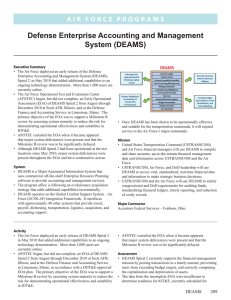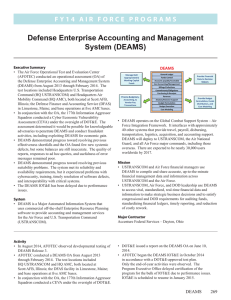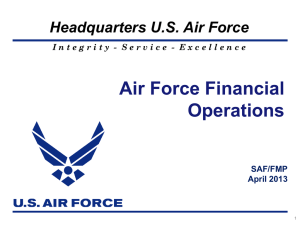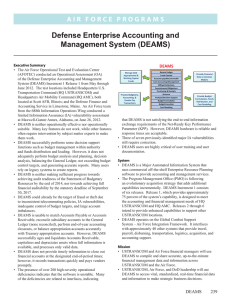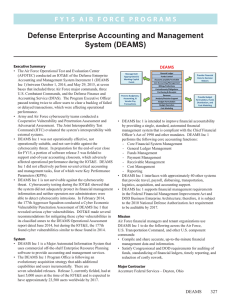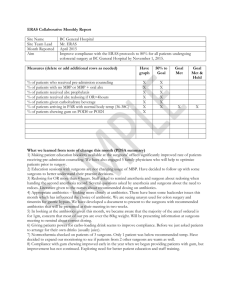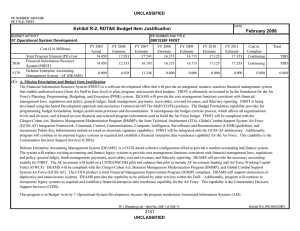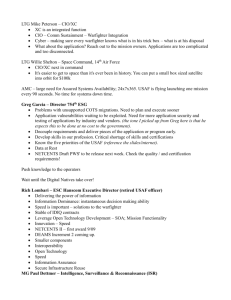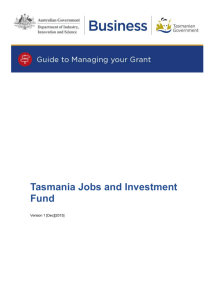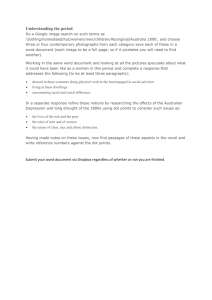Defense Enterprise Accounting and Management System (DEAMS)
advertisement
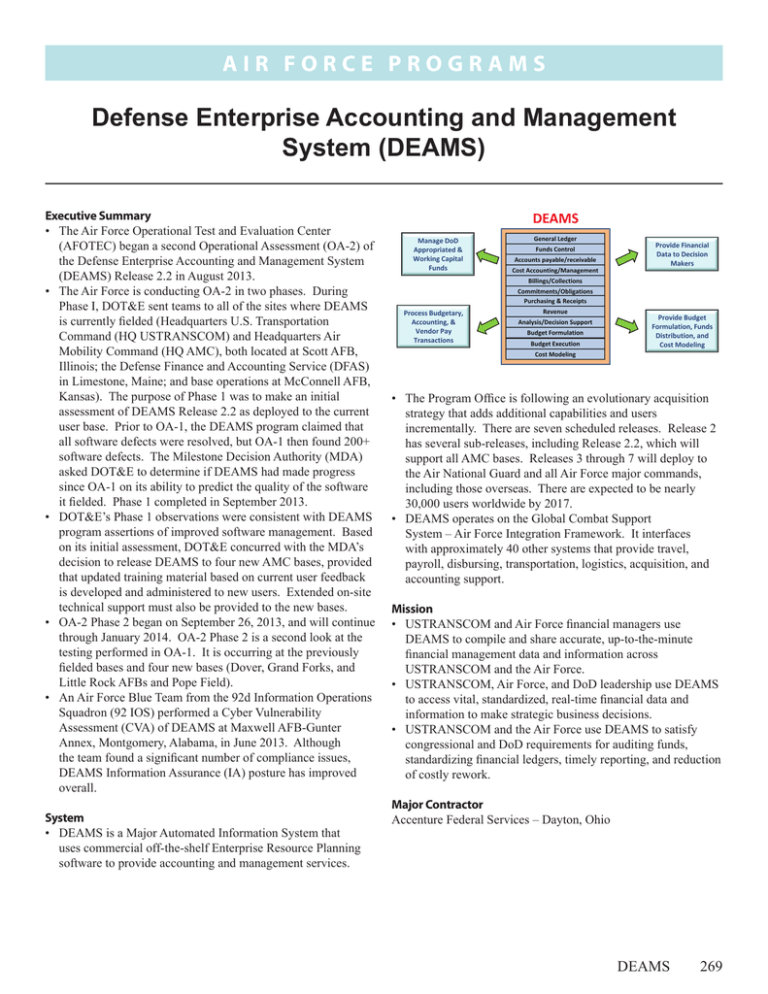
A i r F o r c e P RO G R A M S Defense Enterprise Accounting and Management System (DEAMS) Executive Summary • The Air Force Operational Test and Evaluation Center (AFOTEC) began a second Operational Assessment (OA-2) of the Defense Enterprise Accounting and Management System (DEAMS) Release 2.2 in August 2013. • The Air Force is conducting OA-2 in two phases. During Phase I, DOT&E sent teams to all of the sites where DEAMS is currently fielded (Headquarters U.S. Transportation Command (HQ USTRANSCOM) and Headquarters Air Mobility Command (HQ AMC), both located at Scott AFB, Illinois; the Defense Finance and Accounting Service (DFAS) in Limestone, Maine; and base operations at McConnell AFB, Kansas). The purpose of Phase 1 was to make an initial assessment of DEAMS Release 2.2 as deployed to the current user base. Prior to OA-1, the DEAMS program claimed that all software defects were resolved, but OA-1 then found 200+ software defects. The Milestone Decision Authority (MDA) asked DOT&E to determine if DEAMS had made progress since OA-1 on its ability to predict the quality of the software it fielded. Phase 1 completed in September 2013. • DOT&E’s Phase 1 observations were consistent with DEAMS program assertions of improved software management. Based on its initial assessment, DOT&E concurred with the MDA’s decision to release DEAMS to four new AMC bases, provided that updated training material based on current user feedback is developed and administered to new users. Extended on-site technical support must also be provided to the new bases. • OA-2 Phase 2 began on September 26, 2013, and will continue through January 2014. OA-2 Phase 2 is a second look at the testing performed in OA-1. It is occurring at the previously fielded bases and four new bases (Dover, Grand Forks, and Little Rock AFBs and Pope Field). • An Air Force Blue Team from the 92d Information Operations Squadron (92 IOS) performed a Cyber Vulnerability Assessment (CVA) of DEAMS at Maxwell AFB-Gunter Annex, Montgomery, Alabama, in June 2013. Although the team found a significant number of compliance issues, DEAMS Information Assurance (IA) posture has improved overall. System • DEAMS is a Major Automated Information System that uses commercial off-the-shelf Enterprise Resource Planning software to provide accounting and management services. • The Program Office is following an evolutionary acquisition strategy that adds additional capabilities and users incrementally. There are seven scheduled releases. Release 2 has several sub-releases, including Release 2.2, which will support all AMC bases. Releases 3 through 7 will deploy to the Air National Guard and all Air Force major commands, including those overseas. There are expected to be nearly 30,000 users worldwide by 2017. • DEAMS operates on the Global Combat Support System – Air Force Integration Framework. It interfaces with approximately 40 other systems that provide travel, payroll, disbursing, transportation, logistics, acquisition, and accounting support. Mission • USTRANSCOM and Air Force financial managers use DEAMS to compile and share accurate, up-to-the-minute financial management data and information across USTRANSCOM and the Air Force. • USTRANSCOM, Air Force, and DoD leadership use DEAMS to access vital, standardized, real-time financial data and information to make strategic business decisions. • USTRANSCOM and the Air Force use DEAMS to satisfy congressional and DoD requirements for auditing funds, standardizing financial ledgers, timely reporting, and reduction of costly rework. Major Contractor Accenture Federal Services – Dayton, Ohio DEAMS 269 A i r F o r c e P RO G R A M S Activity • To support a limited fielding decision, AFOTEC conducted an OA from May 30 through June 15, 2012. The OA results showed that DEAMS Increment 1 Release 1 had numerous substantial deficiencies and was not making adequate progress toward achieving operational effectiveness and operational suitability. OA-2 was added to gauge program progress and to inform the DEAMS MDA’s decision for further base deployments and Milestone C. • AFOTEC began OA-2 of DEAMS Release 2.2 in August 2013 in accordance with a DOT&E-approved test plan. The Phase 1 test locations include HQ USTRANSCOM and HQ AMC, both located at Scott AFB, Illinois; the DFAS facility in Limestone, Maine; and base operations at McConnell AFB, Kansas. • The Air Force is conducting OA-2 in two phases. During Phase I, DOT&E sent a team to all of the Phase 1 test sites to make a limited initial assessment of DEAMS progress since OA-1. Phase 1 was completed in September 2013. • Phase 2, which includes four new bases, began on September 26, 2013, and will continue through January 2014. • An Air Force Blue Team from the 92 IOS performed a CVA of DEAMS at Maxwell AFB-Gunter Annex, Montgomery, Alabama, in June 2013. Although the team found a significant number of compliance problems, DEAMS IA posture has improved overall. Assessment • The DOT&E assessment of DEAMS prior to the October limited fielding included interviews with current users and system managers. The assessment determined how well DEAMS has progressed since OA-1 in its ability to manage software defects, patches, and pre-deployment regression testing. DOT&E observers sought to understand the operational impacts of the DEAMS Release 2.2 fielding on the current DEAMS users. The assessment plan expected that major deficiencies, such as were found in OA-1, would be immediately apparent and that interviews with the individuals responsible for configuration management would confirm or deny program claims of greatly improved rigor. 270 DEAMS • DEAMS appears to have improved configuration management by incorporating a new incident reporting system known as Serena. The systems integrator is now conducting regression testing prior to operational fielding (which should have been the case previously), and the need for software rollbacks have consequently decreased. Effective workarounds for existing software defects have been well documented at DFAS‑Limestone. However, few of the workarounds below that level have been documented, particularly at the base level. • Although configuration management has improved, there are still a large number of unresolved defects and several currently required capabilities and enhancements are scheduled for implementation in future software releases. • Feedback from new users at McConnell AFB indicated that the training they had received was inadequate. They noted that it focused on navigating DEAMS but did not provide them with a real understanding of the system and its application to their day-to-day work process. Users also stated that they need more on-site technical support during DEAMS implementation. • Based on its assessment, DOT&E concurred with the MDA’s decision to release DEAMS to four new AMC bases, provided that training and on-site support are improved. Recommendations • Status of Previous Recommendations. The program is addressing five of the six previous recommendations. The Program Office and the Functional Management Office still need to document workarounds out to the base level. • FY13 Recommendations. The program manager should: 1. Correct IA deficiencies noted in the June 2013 CVA and perform both IA and financial fraud penetration testing. 2. Update training material based on current user feedback before training new users. 3. Provide more on-site technical support to the new users at the base level.
